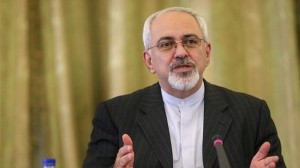 Iran's foreign minister turns to damage control after Iranian news agency reports that Tehran is expected to propose new solution to nuclear problem during upcoming talks with P5+1.
Iran's foreign minister turns to damage control after Iranian news agency reports that Tehran is expected to propose new solution to nuclear problem during upcoming talks with P5+1.Iranian Foreign Minister Mohammad Javad Zarif tweeted Friday: �We will present our views, as agreed, in Geneva, not before. No Rush, No Speculations Please �
The purpose of Zarif�s tweet was apparently to try and lower expectations around the planned talks in Switzerland on Tuesday between representatives of the six world powers � the United States, Russia, China, Britain, Germany and France (the P5+1) � and�Iran. Zarif knows that the higher the expectations, the greater the risk that this round of talks will be deemed a failure.
The implications of such a failure for Iran could be severe: A continued collapse of its economy and new international sanctions in the best case; American or Israeli military action in the worst.
Zarif aspires to a modest outcome, setting a date for the next round of talks as quickly as possible.
The foreign minister is trying to close the stable door, but the horses have long bolted and raised the level of expectations. Iranian news agency IRNA reported Friday that Zarif and his negotiating team will present a new proposal for a solution to the nuclear problem. Anonymous Iranian diplomats quoted in the report said the new proposal would promote a solution that would be a �win-win result.�
The Iranian media has been full of reports, the purpose being to improve the atmosphere ahead of the talks and show the six powers of the seriousness of its intentions.
�Tehran is not after negotiations for the sake of negotiations, but instead wants its nuclear issue to be resolved in a short time. In the new round of talks, Tehran is not to walk in a dark and aimless corridor with no bright prospects � in fact, Tehran was trying to change the atmosphere of the talks from confrontation into interaction by discussing realistic and acceptable proposals,� Iranian diplomats told IRNA.
In an effort to distance himself from his predecessor, Iranian President�Hassan Rohani�has cancelled the New Horizons Conference, which was set to take place in Tehran next month. The conference � the �baby� of former Iranian president Mohammed Ahmadinejad � is better known in Israel and the West as an�anti-Zionist forum. The British Daily Telegraph reported Friday that the Iranian Foreign Ministry ordered the conference�s cancellation.
The general outlines of the Iranian proposal are already clear. The Iranians are expected to propose stopping their enrichment of uranium at 20 percent and remove most of the enriched material � about 180 kilograms � from Iran.
They are also expected to limit the number of centrifuges in operation at the various enrichment sites, and perhaps even shut down the enrichment facility at Fordo.
The Iranians have also shown a willingness to increase international monitoring of their atomic energy program. In exchange, Tehran will ask for sanctions to be lessened, particularly the oil embargo and banking sanctions.
At this point, it seems the six powers will be in no hurry to adopt any Iranian proposal. In exchange for Iranian concessions, they are willing to give much less than the Iranians are hoping for. They will also want answers from Tehran regarding the heavy water reactor in Arak for plutonium production, and facilities in which it is suspected Iran is experimenting with the construction of a nuclear warhead.
Meanwhile, Prime Minister�Benjamin Netanyahu�spoke�by phone with French President Francois Hollande and British Prime Minister David Cameron over the weekend. According to senior officials in Jerusalem, Netanyahu told the leaders that sanctions on Iran are close to achieving the desired outcome � the dismantling of the Iranian military nuclear program - but that until that happens the sanctions should not be lifted � and, in fact, should be toughened.
Elysee Palace issued a statement that France would remain tough on Iran and would not allow the lifting of sanctions without Iranian steps in exchange.
Netanyahu made the phone calls after granting interviews to six media outlets in France, Britain and Germany, after which he called The New York Times� Israel correspondent, Jodi Rudoren, to his office.
Rudoren�s subsequent article depicted Netanyahu as, on the one hand, �seeming frozen in the past amid a shifting geopolitical landscape� and �increasingly alone abroad and at home,� but, on the other, �determined and focused, the atmosphere in his office one of urgency, not panic.�
By Haaretz
The Iran Project is not responsible for the content of quoted articles.










